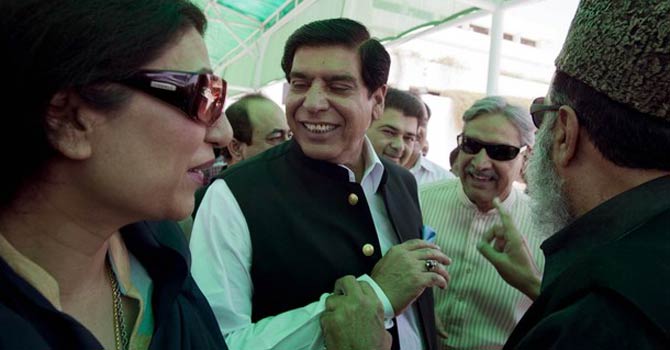ISLAMABAD: On Thursday the federal capital was jolted by two tremors. One a 6.1 magnitude earthquake that hit Islamabad and the other a shockwave sent to the new government by the Supreme Court with a message that it cannot evade the responsibility of writing the contentious letter to Swiss authorities for reopening graft cases against President Asif Zardari.
But the language of the order that came out late afternoon was such that the new government of Raja Pervez Ashraf got a breathing space for at least 13 more days to elucidate its plans about implementing the NRO verdict.
So far the new prime minister has not yet been asked to appear in person before the court as Yousuf Raza Gilani did thrice.
“Adjourned to July 25 on which date the Prime Minister of Pakistan/Chief Executive of the Federation shall cause a report to be submitted before this court regarding compliance of the directions contained in paragraph No. 177 and 178 (writing the letter to Swiss authorities) of the judgment passed by this court in case of Dr Mobashir Hassan (NRO case) failing which this court may initiate any appropriate action under the Constitution,” concluded Justice Asif Saeed Khosa while reading out a longish order after pretty long deliberations with other members of the five-judge bench.
All morning the Supreme Court was the focus of attention as people waited with bated breath expecting an order against the new government similar to the one which sent the earlier cabinet of Yousuf Raza Gilani home for failure to implement the NRO verdict.
“Have a cup of tea,” Justice Khosa said while pointing to Attorney General Irfan Qadir after listening to the instructions he got, adding that the court would discuss on how to respond to what the AG had stated.
“We will adjourn the proceedings (NRO implementation case) till 3.30pm,” Justice Khosa said after very brief proceedings held at 2’O clock following normal court timings.
The news broke by different television channels that the court would give its verdict led quite a sizeable number of lawyers and journalists to crowd the courtroom, not the one which the chief justice usually presides, but the one headed by Justice Asif Saeed Khosa.
The views among lawyers discussing the outcome of deliberations among the judges in different groups were also divergent. Most of them were of the opinion that the court would grant more time while some were expecting that this time the court might spare the new prime minister and instead arraign the president in the matter.
When the proceedings commenced, Irfan Qadir appeared before the bench and said he had a meeting with the prime minister the other day to seek instructions as ordered by the court at the last hearing on June 27.
“The cabinet had taken up the matter and it desired that the law ministry should furnish its views as regards the matter of implementation of the NRO judgment,” the AG said, adding that as and when the law ministry rendered its opinion, the cabinet would take a decision in accordance with the provisions of the Constitution.
“When shall it be finalised,” asked Justice Khosa.
“The law secretary as well as the minister are relatively new and so many orders having nexus with the decision have to be studied in depth by the ministry,” the AG said and requested the court to take up the matter after court vacations ending some time in mid-September. The reply, however, was not approved by the court when it said in its order that it was constrained to observe that the court found it difficult to appreciate or accept the response of the prime minister.
The order as usual was dissected by legal experts with many of them agreeing that the best option the Supreme Court has in the present scenario is to invoke the third option it had suggested in its January 10 order. The option speaks about formation of a commission under Article 187 of the Constitution and Rules 1 and 2 of Order 32 of the Supreme Court Rules 1980 to execute relevant parts of the NRO judgment.
“Yes I believe that the best way forward is to appoint the commission as in this way the direct confrontation between the executive and the judiciary could be avoided,” commented senior Supreme Court lawyer Raja Muqsit Nawaz.
“It is evident that the PPP government will not write the letter at any cost,” said Tariq Mehmood, former president of the Supreme Court Bar Association. He said the setting up of the commission appeared to be the only way of wriggling out of the quagmire.
Through the commission, he added, the Supreme Court could direct its registrar to write the letter instead of the government.
As an alternative, Mr Mehmood said, the apex court could decide different challenges to the Contempt of Court Act 2012 and after suspending the law, though a very remote chance, initiate similar contempt proceedings against the prime minister as was done in the case of Yousuf Raza Gilani.
Babar Sattar, another constitutional expert, was also of the view that the court could ask for writing the letter by constituting the commission in case the prime minister failed to take a decision on the matter.
The order also settled the immunity issue by recalling that Barrister Aitzaz Ahsan, who was representing the former prime minister, had categorically maintained that the immunity was enjoyed by a head of the state under the customary international law and not the one contemplated by Article 248 of the Constitution.
“This court had observed in the June 26 judgment (of convicting Mr Gilani) that an immunity under the customary international law was relevant to, and could be invoked by the person concerned before a foreign court and was, thus, irrelevant to the contempt of court proceedings against the then prime minister. That judgment of this court has already attained finality as it was never challenged through any appeal or review,” the order said.












































